
THE CHILDERMASS TAROT READING
In Chapter 21, ‘The Cards of Marseilles’, Vinculus tells Childermass that he will tell his fortune and lays out a 9 card tarot reading. However Vinculus fails to read the cards and the reading remains uninterpreted.
This is my attempt to read that reading.
Though it's possible
that all I am doing is taking the cards and applying my knowledge of
the subject as known from the book and extrapolating from there.
Also there is the question of what method the author used when
assigning the cards to the reading.
Did she just pick a random
bunch of cards, or did she choose them specifically for their
meaning?
And if so, which meanings was she using, because there
are many different ones, especially when it comes to the Marseilles
tarot.
Most modern books of meanings come from the occult revival at
the
beginning of the 20th C. from the work of Mathers, Waite and Crowley,
it is these which I am most familiar with and they diverge radically
from the traditional meanings assigned to the Marseilles.
And even
these traditional meanings diverge from each other.
So…
I am interpreting the reading using the given reading (for Vinculus) as a model, and also using some of the themes of the book to modify the meanings of the cards so that they relate specifically to the England of the book.
The reading for Vinculus is given in a linear fashion, it progresses through time and there appear to be no specific meanings to any of the card positions.
In the Vinculus reading the beginning of the reading is the
present.
However, in the Childermass reading he says "that is
my life - there on the table." Which would imply that it spanned
a greater period of time than just the present and the immediate
future.
There is also the question of how to read it.
Do I read it as
Childermass himself might have read it when he looked at the cards
and declared that they were his life?
Or do I read them using my
knowledge of the subject’s future gained through the reading of the
novel?
Where these two interpretations diverge I will try to cover
both of them, though it must be remembered that with any tarot
reading there are many interpretations, most of which are valid.
This
is not the only way to read these cards, this is only the way I have
read them.
Ok.
The reading is as follows. (Rx = Reversed)
XVIII La Lune; XVI La Maison Dieu Rx; The 9 of Swords; Valet de Baton; The 10 of Batons Rx; II La Papess, X La Roue de Fortune; The 2 of Coins; The King of Cups.
9 cards in total, two reversed, two court, three minors, 4 trumps; Which is a pretty fair spread, probably more trumps than would be expected, either arguing for the author planning this reading rather than letting the cards fall randomly, or indicating that there are great events in motion.
The card pictures are from a reprint of an 18th century deck. They deviate in minor ways from some of the cards described in the book, however, scans of those cards are unavailable and these will have to do.
Looking at the reading as a person’s life I would say that the
present, and the person himself is indicated by the Valet of
Batons.
Therefore everything before this card is the past, the
Valet and the two cards after it are the present and the last three
cards indicate the future.
For the last two groups (present and future) we have the book
as a
guide to the interpretation.
However we have very little knowledge
of the sitters past. He was poor, he had many careers in his youth,
he was a thief and the son of a thief, who was also, possibly, a
whore.
Which isn't really much to go on, and leaves a lot of
questions unanswered.
Where did he get his obvious education?
How
did he come to work for Norrell?
What were his previous careers?
Can the cards answer these questions?
No.
They can't and
they won't.
But they do tell us something.
The Past
XVIII La Lune; XVI La Maison Dieu Rx; The 9 of Swords


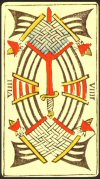
These are three such awful cards that if they described my past I would sit down and weep.
La Lune (The moon). A Cray fish crawls from the water, the
moon
hangs above it in the sky, a narrow path leads from the water to the
horizon flanked by two howling dogs/wolves and two towers upon hill
tops.
This is a card of night time, nightmares, subconscious
desires, of walking a narrow path between two dangers, it is also a
card of women, and of occult forces.
This card therefore would indicate the subjects earliest
childhood
and the influence of his mother.
This was not a good time for the
subject, prey to many dangers he needed to keep his wits about him to
travel that narrow road without falling victim to the hazards that
lurk on either side.
The connotations of witchcraft and occult
forces in this card might, in the circumstances, indicate that even
in his earliest years the subject was a part of the spell that John
Uskglass was doing.
La Maison Dieu Rx (the house of god). A tall tower is struck
by
lightning, the top of the tower crumbles and bursts into flame. Two
figures fall from the tower toward the ground.
This is the card of
destruction and catastrophe. At its worst it is total loss, at its
best it would be a clearing away of the old to make way for the new.
In either case it is sudden, unexpected and terrible when it
occurs.
That the card is reversed would either make the
destruction of greater, or lesser import depending on how the reader
deals with reversals.
I subscribe to the view that all reversals
are bad, and that they make a bad card worse rather than better.
This shows that however carefully the subject walked the
narrow
path, eventually destruction came and when it did it was all
encompassing and took all that he had ever known with it.
It also
tells me that however difficult his childhood was, its loss left him
bereft.
What form the destruction took is difficult to say, it is
the immensity of it that is important, not it's cause, but I could
guess at the arrest and execution of the mother.
A second
possibility would be a short stint in the army showing without any
possibility of doubt the 'half-eggcupfull of glory and the barrelful
of misery...'
Whatever the cause, the destruction of the subjects
life shown by this card was complete and without measure.
9 Swords. This card shows 9 swords, 8 in a curving pattern and
one
straight one in the centre.
Swords have been variously ascribed to
the military or to the darker emotions, sorrow, loss and strife. The
9 is variously ascribed the meanings, death, delay, deception,
disillusionment. Swords are sometimes also associated with magic and
the occult.
This card would either be the corollary of the previous card;
one
showing the event, the other the effect, or it would depict the
subject’s life after the fall of the house of god. The many
careers, the poverty that did not even allow him the paper on which
to draw the cards he had borrowed.
It would appear that it was
during this phase of his life that the subject drew the cards because
of his obvious poverty at the time they were created. If he had made
the cards whilst in the magicians employ he would have had access to
paper or card to draw them on, either bought from his wages or
'borrowed' from the stationary stores of his master. This shows both
an interest and ability in the magical arts before going into the
employ of the magician.
The Present.
Valet de Baton; The 10 of Batons Rx; II La Papess.
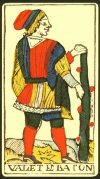
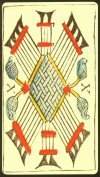
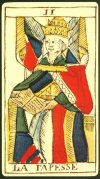
There are two cards from the suit of batons in this reading. Traditionally the four suits are assigned to four classes of people. Batons represent servants, lawyers, anyone who carries a staff of office. Batons would be the designation of a ‘man of business’ in the sense that the phrase is applied to Childermass.
Valet de Batons. A young man, standing, well dressed, holds a
rough club of wood, it's blunt end resting on the ground.
This
card indicates a young man with dark hair, it also indicates
messages, ambition and hard work.
This, without any doubt is the subject himself entering the
employ
of the magician, Norrell. At the beginning of their connection the
subject would be as indicated by the card, ambitious, hard-working,
keen to learn, hoping to profit from the association.
It has
already been show that the subject had an interest in the magical
arts before his employment with the magician. It could therefore be
assumed that in taking the position with Norrell the subject hoped he
would learn magic from his master, becoming apprentice rather than
servant.
10 of Batons Rx. 8 wands crossed diagonally, two more crossing
vertically.
Batons are the suit of enterprise, creation, labour
and business.
The 10 of Batons is a card of travel and of
successful business dealings, the reversal of this card would
indicate a lack of success in these fields.
In the reading this card shows that the subjects hopes were unfulfilled, although he was successful in his position, although he travelled on his masters business and was successful in his undertakings he never rose above the position of servant, his master withheld his magical knowledge from him as he withheld it from all. At this point in the reading the ambition of the Valet is unfulfilled.
The Papess (the female pope). A woman, dressed in robes,
wearing a
double tiara upon her head sits upon a throne. Upon her lap she holds
an open book.
This is the only card in the reading where we are
given the meaning. Later in the book we are told that Childermass
interprets this card as 'something hidden'. This is how he would have
seen it in the reading that Vinculus laid out for him.
This
reading of the card is in harmony with the usual meaning for this
trump. Hidden wisdom, occult power, initiation.
In the reading this card means that the subject is searching
for
the thing that is hidden and therefore would indicate the genesis of
the search for the book that Vinculus told him of, 'The greatest
glory and the greatest burden...' the book that the magician of
Hanover Square will never own or even see.
It could be questioned
at this point whether Childermass searched for the book for his
master or for himself. Certainly he went to Yorkshire to search for
it without telling Norrell where he was going or why.
It is
possible that the subject felt that the book was the way out of the
dead end he found himself in with his master, if he could find that
book he would not need the knowledge that Norrell was withholding
from him, the reversal in the 10 of batons could be righted.
It is
possible that Childermass himself saw this card as representing the
book whose existence Vinculus had so recently revealed to him, the
book that would soon come to obsess him. Certainly this card appears
in later readings Childermass did on the subject of the book. However
it is possible that Childermass at the time of the reading saw this
card in different light.
He could have interpreted it as his own talent as a magician, a talent that he was hiding from Norrell, in this case the book that the Papess holds could be the cards themselves, the cards that Childermass had owned for many years yet had never, at this point in time, revealed to his Master.
It could also have suggested other secrets Childermass was
keeping. He went to Vinculus on that day on Norrell’s orders, but
with no intention of acting as Norrell intended, as he says to
Vinculus "I do not care to be told how to conduct my business."
It is more than possible that either of those two interpretations
maybe how the subject himself would have seen the card when he stated
that the reading was his life.
However, it seems clear to me from
my privileged view point outside the novel that the card, indeed the
whole reading, revolves around the book of John Uskglass. It is that
meeting with Vinculus where the subject first learns of the books
existence and it is from that day that he searches for it, with and
without his Master’s permission.
It becomes his obsession as
much as it is his future.
The Future.
X La Roue de Fortune; The 2 of Coins; The King of Cups.

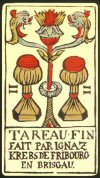
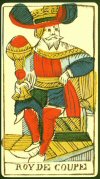
La Roue de Fortune (the wheel of fortune). This card shows a
spoked wheel upon a stand, from the centre protrudes a handle to turn
it. Three strange creatures are arrayed around the wheel. One sits on
top wearing a crown and holding a sceptre, the one on the right of
the card faces up toward the top of the wheel as though rising up,
the creature on the left faces down as though falling.
This is the
wheel of fortune. As the wheel turns the creatures rise to the top
and fall down below, it is a card of luck (good and bad) and of
change. It's interpretation states that the wheel will turn, what is
above will fall below, what is below will be raised up.
This card
promises the subject that his fortunes will change. Possibly it was
this card he was thinking of when later he tells Strange that Norrell
is the last master he will ever have. This card assures him that he
will not be a servant forever. He may also have wished to read in it
that his enemies would be cast down while he himself was raised up; a
situation that in many ways eventually came to pass. In the case of
Lascelles and Drawlight their falls were complete. In the case of
Norrell the fall (into perpetual darkness) is less complete and one
wonders if he really minded at all; never the less it was Childermass
who remained in the world to gain the book that Norrell never saw,
and to re-establish the York society that Norrell had forced to
disband. In effect it was Childermass at that meeting in York who
re-established and re-enabled the practice of English Magic, who gave
them permission to re-form and showed them the book and the path that
they must take.
2 of Coins. Two large gold coins are connected by a ribbon or
banner that winds round them in an S shape, usually this banner
contains the name of the maker.
Coins are the suit of merchants,
of money, of material wealth and possessions. The two of coins is
variously interpreted as meanness, theft, broken promises and
financial difficulties.
How Childermass himself saw this card is open to question,
without
doubt he did not trust those who had inveigled themselves into his
master’s inner circle, Drawlight and Lascelles, he may have felt
that they were a threat to his own position. Nor did he trust Norrell
from whom he kept so many secrets, and of whom Vinculus had so
recently said ‘all magicians lie and this one more than most’,
words that Childermass was to remember for a long time to
come.
Therefore it is more than likely that the subject saw this
card and predicted a future break with Lascelles and Drawlight and
with Norrell himself.
A break that did eventually take place,
caused by the lies and theft of Lascelles in regard of Lady Pole's
finger and the message from Strange that led to the subject’s
subsequent expulsion from Hurtfew.
However this card can also be
read in a different way. If the book is considered to be a possession
then this card would relate to the subject taking possession of it
and the difficulties therein. Firstly the book that the subject
searched for and desired no longer exists, it has changed, it has
become different. Secondly the book is not an inanimate object, it is
written upon a person, a liar and a thief.
The subject will find
it difficult to profit from this unreadable, obstreperous book.
In
this sense the card can be seen as two people, Childermass and
Vinculus bound together by the words of the book as the coins are
bound together by the written ribbon.
The King of Cups. A richly dressed, bearded king sits upon a
throne holding an elaborate cup in his hand.
In the usual way of
things this card would mean a mature man of fair complexion, good and
warm hearted, possibly domineering in emotional matters.
The suit
of cups is traditionally ascribed to the Church as Batons are given
to servant, Coins to Merchants and Swords to the military. However in
the England of the novel there is another class of people who have to
be taken into account. These are the Magicians. It would be my choice
to place them with the church in the suit of cups.
It is said a
number of times in the book that all a magician needs is a silver
bowl, that it is his badge of office. In the story of the glove
makers child The Raven King is identified partly by the silver bowl.
In the reading Childermass did for Vinculus he is identified as the
Valet of Cups, as Vinculus is the servant and creation of The Raven
King's magic I would suggest that the cup the valet carries is the
symbol of both Magic and of John Uskglass.
Therefore, if the Valet
of cups is the servant of John Uskglass then the King of cups must be
the Raven King himself.
The reading can certainly be read in this
way, the last card indicating the meeting between the subject and the
King that enables the book to live and allows the subject to possess
that book and take it/him to the magicians of England.
It is
unlikely that Childermass himself saw this as the meaning when
Vinculus laid out the cards. It is more likely in that case that he
saw the king as himself and saw it as a promise for his eventual
transition from the Valet of Batons (Norrell’s servant and ‘man
of business’) to a magician, a king of cups in his own right.
